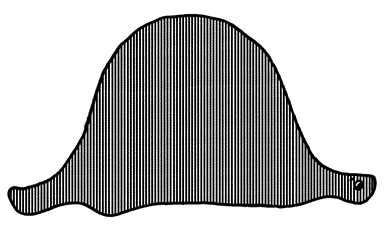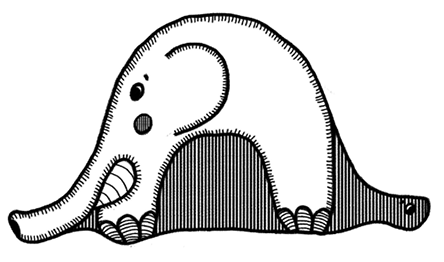
Маленький принц / The Little Prince

Антуан де Сент-Экзюпери / Antoine de Saint-Exupéry
Маленький принц / The Little Prince
Иллюстрации Е.Д. Шавиковой
© Матвеев С.А., адаптация текста, коммент., упражнения и словарь, 2019
© Шавикова Е.Д., иллюстрации
© ООО «Издательство АСТ», 2019
1
Once when I was six years old I saw a magnificent picture in a book, called True Stories from Nature, about the primeval forest. It was a picture of a boa which was swallowing an animal. Here is a copy of the drawing:

In the book it said: “Boas swallow their prey whole, they do not chew it. After that they are not able to move, and they sleep through the six months that they need for digestion.”
I thought about it. And then I made my first drawing. My Drawing Number One. It looked like this:

I showed my masterpiece to the grown-ups, and asked them whether the drawing frightened them.
But they answered: “Frighten? Why can anyone be frightened by a hat?”
My drawing was not a picture of a hat. It was a picture of a boa which was digesting an elephant. But the grown-ups were not able to understand it. They always needed explanations. So I made another drawing: I drew the inside of the boa. This time the grown-ups could see it clearly. My Drawing Number Two looked like this:

The grown-ups advised me not to draw the boas from the inside or the outside, and study geography, history, arithmetic, and grammar. That is why, at the age of six, I stopped drawing. So I did not become a famous painter. I was disheartened by the failure of my Drawing Number One and my Drawing Number Two. Grown-ups never understand anything by themselves, and it is tiresome for children to explain things to them all the time.
So I chose another profession, and became a pilot. I flew over all parts of the world; and it is true that geography was very useful to me. Now I can distinguish China from Arizona.
I have met many people. I lived among grownups. I saw them intimately, and that did not improve my opinion of them.
When I met one of them who seemed clever enough to me, I tried to show him my Drawing Number One. I tried to learn, so, if this person had true understanding. But he—or she—always said,
“That is a hat.”
Then I did not talk to that person about boas, or forests, or stars. I talked to him about bridge, and golf, and politics, and ties.
2
So I lived my life alone and had no one to talk to, until I had an accident with my plane in the Desert of Sahara, six years ago. Something broke in my engine. And I had with me neither a mechanic nor any passengers. So I began to repair it all alone. It was a question of life or death for me: I had very little drinking water.
The first night, I went to sleep on the sand, a thousand miles away from any town. I was more isolated than a sailor on a raft in the middle of the ocean. Thus you can imagine my amazement, at sunrise, when I was awakened by an odd little voice. It said:
“Will you please draw me a sheep!”
“What!”
“Draw me a sheep!”
I jumped to my feet and looked carefully all around me. And I saw a most extraordinary small person who stood there. He was examining me with great seriousness.
Remember, I crashed in the desert a thousand miles from any town. The child did not seem hungry or thirsty or frightened. He was not looking like a child lost in the middle of the desert. When at last I was able to speak, I said to him:
“But—what are you doing here?”
And he repeated, very slowly:
“Will you please draw me a sheep.”
Конец ознакомительного фрагмента.
Текст предоставлен ООО «Литрес».
Прочитайте эту книгу целиком, купив полную легальную версию на Литрес.
Безопасно оплатить книгу можно банковской картой Visa, MasterCard, Maestro, со счета мобильного телефона, с платежного терминала, в салоне МТС или Связной, через PayPal, WebMoney, Яндекс.Деньги, QIWI Кошелек, бонусными картами или другим удобным Вам способом.
Вы ознакомились с фрагментом книги.
Для бесплатного чтения открыта только часть текста.
Приобретайте полный текст книги у нашего партнера:
Всего 10 форматов